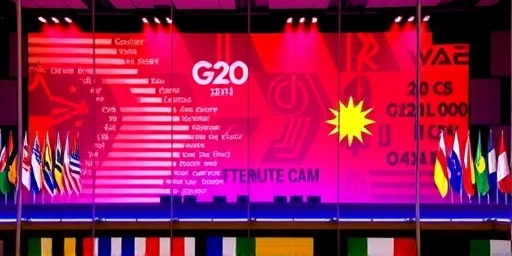In a powerful opening to the G20 Leaders Summit in New Delhi, South African President Cyril Ramaphosa issued a stark warning about the mounting debt crisis threatening low-income countries, urging global powers to prioritize debt sustainability and inclusive growth. As world leaders gathered amid geopolitical tensions and economic uncertainties, Ramaphosa’s address set the tone for discussions on reforming international finance institutions to better support vulnerable economies.
Ramaphosa’s Opening Salvo: Debt Crisis Demands Immediate Global Action
President Cyril Ramaphosa, representing one of Africa’s key economies, wasted no time in highlighting the precarious state of global finances during the summit’s inaugural session. “The debt burdens faced by low-income countries are not just numbers on a balance sheet; they are chains that bind entire populations to poverty and instability,” Ramaphosa declared, drawing applause from delegates. His speech underscored the G20‘s pivotal role in addressing these issues, especially as developing nations grapple with post-pandemic recovery and rising interest rates.
According to recent data from the World Bank, over 60 low-income countries are at high risk of debt distress, with total external debt reaching $1.1 trillion in 2023. Ramaphosa pointed to specific cases like Zambia and Ghana, where defaults have led to humanitarian crises, emphasizing that without coordinated action, these nations could face decades of stagnation. He called for an extension of the Debt Service Suspension Initiative (DSSI) and enhanced funding for the Common Framework for Debt Treatments, mechanisms previously endorsed by the G20.
The South African leader’s remarks resonated deeply in a room filled with representatives from both wealthy and emerging economies. Indian Prime Minister Narendra Modi, as host, echoed these sentiments, stating, “Inclusive growth must be the cornerstone of our agenda; no nation should be left behind in the pursuit of sustainable development.” This alignment signals a potential shift toward more equitable international finance policies, moving beyond the traditional North-South divide.
Reforming International Financial Institutions: A G20 Priority for Equity
At the heart of the summit’s opening discussions was a push to overhaul key international finance bodies like the International Monetary Fund (IMF) and World Bank. Ramaphosa advocated for increased voting rights for developing countries, arguing that the current governance structures, dominated by Western powers, undermine debt sustainability efforts. “Reform is not optional; it is essential for the legitimacy and effectiveness of these institutions,” he asserted.
Statistics paint a grim picture: Emerging markets hold only about 40% of voting shares in the IMF despite comprising over 85% of the world’s population. Delegates from Brazil and Indonesia supported this call, proposing a 25% quota increase for low-income members to reflect contemporary economic realities. The G20, which represents 85% of global GDP, has historically driven such reforms, as seen in the 2010 IMF quota realignment.
During a breakout session, U.S. Treasury Secretary Janet Yellen acknowledged the need for change, noting, “We must ensure that international finance serves all nations equitably, especially in times of crisis.” However, tensions arose with European leaders wary of diluting their influence. Experts predict that any agreement on reforms could unlock billions in concessional lending, vital for inclusive growth in Africa and Asia.
To illustrate the stakes, consider Ethiopia’s ongoing negotiations with creditors. Trapped in a cycle of high servicing costs—amounting to 30% of its budget—the country exemplifies how outdated international finance frameworks exacerbate vulnerabilities. The G20 summit aims to accelerate such restructurings, potentially through a new liquidity facility proposed by the African Union.
Inclusive Growth Strategies Take Center Stage Amid Economic Disparities
Shifting focus to inclusive growth, the summit spotlighted initiatives to bridge the widening inequality gap. Ramaphosa highlighted how the COVID-19 pandemic and the Ukraine conflict have disproportionately affected marginalized communities, with unemployment in sub-Saharan Africa hovering at 33% for youth. “True inclusive growth requires investments in education, healthcare, and digital infrastructure to empower the excluded,” he said.
The G20 agenda includes the Sherpa track’s recommendations for a global social protection floor, aiming to cover 4 billion people by 2030. Countries like Argentina and South Africa shared success stories: Argentina’s universal child allowance program lifted 5 million out of poverty, while South Africa’s expanded grants during the pandemic prevented a deeper recession.
Yet challenges persist. Climate change adds another layer, with low-income countries facing $100 billion in annual losses from extreme weather, per UN estimates. Leaders discussed green bonds and sustainable finance mechanisms to fund inclusive growth without compromising debt sustainability. The European Union pledged €300 billion in climate finance over five years, conditional on governance reforms.
In a panel on digital inclusion, experts from the World Economic Forum noted that only 37% of people in least developed countries have internet access, stifling economic participation. The G20 is exploring a digital public infrastructure alliance, inspired by India’s UPI system, to foster entrepreneurship and job creation in underserved regions.
Global Debt Landscape: Low-Income Countries Face Mounting Pressures
Delving deeper into the debt sustainability crisis, summit participants reviewed alarming trends. The Institute of International Finance reports that emerging market debt hit $100 trillion in 2023, with low-income nations spending 15% of GDP on repayments—diverting funds from essential services. Ramaphosa cited Sri Lanka’s 2022 default as a cautionary tale, where austerity measures sparked social unrest.
G20 finance ministers, in pre-summit meetings, endorsed voluntary private sector participation in debt resolutions, a step forward from the often-reluctant creditor involvement. China, holding 20% of African debt, committed to transparency in its lending practices, addressing criticisms of opaque terms.
Women and youth bear the brunt of these pressures. In debt-distressed countries, girls’ education enrollment drops by 20%, according to UNESCO data, perpetuating cycles of inequality. The summit featured voices from civil society, including Oxfam’s call for a G20 debt justice fund to provide immediate relief.
Comparatively, advanced economies like Japan and Germany, with debt-to-GDP ratios over 200%, benefit from low-interest borrowing, a luxury unavailable to others. This disparity fuels demands for fairer international finance rules, such as suspending surcharges on IMF loans for poor nations.
Forward momentum is evident: The G20 is poised to launch a global debt registry for better transparency, potentially reducing default risks by 30%, as modeled by economists. These steps could pave the way for sustainable development goals, ensuring inclusive growth reaches the most vulnerable.
As deliberations continue over the next two days, expectations run high for concrete commitments. Analysts foresee a joint communique outlining a roadmap for debt sustainability, including $500 billion in multilateral support by 2025. With geopolitical flashpoints like the Middle East adding urgency, the G20 leaders’ ability to forge consensus on international finance reforms will define the summit’s legacy, setting the stage for a more resilient global economy where inclusive growth is not an aspiration but a reality.








